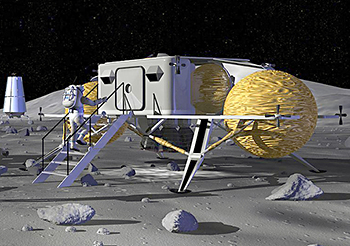Moon Plan 'Comes Up Short'
 |
By failing to incorporate the long-term goals of establishing a permanent base on the Moon and missions to Mars in its new manned space program, the US space agency is missing a prime opportunity, say critics.
"To be blunt, we have big problems with this plan," Henry Vanderbilt, head of the Space Access Society advocacy group, wrote in an e-mail newsletter.
"It's the same basic approach as Apollo: disposable (mostly) spacecraft, on big NASA-proprietary boosters, flown a few times a year, by a standing army of NASA and contractor employees. This is Apollo 2.0."
The plan, outlined by NASA administrator Michael Griffin on Monday, is based on a new capsule that initially would be used to ferry crews and cargo to the space station.
By 2018, however, the spacecraft, with four astronauts aboard, would be routed to the Moon atop a newly developed rocket for the first in a series of lunar expeditions.
The plan leaves open the possibility for developing a permanently occupied base on the Moon, but does not require NASA to do so.
"Like Apollo, NASA's new plan has built into it the seeds of its shutdown by some future Congress once the warm glow of the first few daring missions has once again faded," Vanderbilt said.
'Right cast'
NASA flew a series of missions to the Moon more than 30 years ago as part of its Apollo program. The project was cancelled in 1972 after just six lunar landings.
Heeding the advice of experts investigating the 2003 Columbia accident, President Bush in January 2004 called for the retirement of the shuttle fleet by 2010, after which time the panel believed the ships would need major re-certifications to continue flying.
Bush proposed redirecting the US human spaceflight program back to exploration, with the Moon as the first destination.
Mars settlement activist and author Robert Zubrin applauded Griffin for coming up with the "the first rational plan in any sense that I've seen from NASA in decades."
The new vehicles were not only key to building lunar settlements and staging manned missions to Mars, Zubrin said, they also could be used to finish building the space station more efficiently and for less money.
What they're really developing is equipment to do a rational space station and a Moon programme later," said Zubrin in an interview with BBC News.
"But if someone comes in [as US president] in 2009 and has no interest, he can just say, 'Thank you for rationalising the space station,' and leave it at that.
"I really don't see that there is a better time to get a Moon program going than now when there is a president interested in space and an engineer in charge of NASA. The notion that you would be able to launch this program with a different cast seems incredible," he added.
'Back on track'
Zubrin argues that the rationale for going to the Moon – to learn how to live off Earth – rings hollow, especially when new technologies and equipment can be tested for a fraction of the cost at a simulated base in the Arctic.
For those who grew up during the Apollo program, the resumption of Moon flights seems a far cry from where human space exploration could be.
"I can't believe that we're not already living and working on Mars," Elliot Pulham, president of the Space Foundation industry trade organisation, said.
"It's a shame we wasted the past 20 or 30 years, but we do need to get back on track and get on with this sooner or later. I wish we could go faster, but that is not the political and economic reality today."
Unlike Apollo, Pulham argued, the point of the new Moon program was not to plant a flag and leave. "We're going to the Moon to learn how to do things," he said.
Despite any shortcomings with his exploration blueprint, Griffin expects clear sailing as the plan moves from the White House into Congress for review and funding.
The fatal 2003 Columbia accident and the difficulties returning the shuttle fleet to flight left few if any people calling for the shuttle to remain operational for a decade or longer, as once envisioned.
That leaves the newly-proposed Crew Exploration Vehicle as the only option.
"Unless the US wants to get out of the manned spaceflight business completely, this is the vehicle that we need to be building," Griffin said.
Source: BBC News, Sept 2005